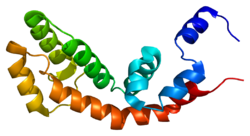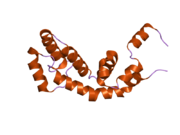RGS2
Regulator of G-protein signaling 2 is a protein that in humans is encoded by the RGS2 gene.[5][6] It is part of a larger family of RGS proteins that control signalling through G-protein coupled receptors (GPCR).
Function
[edit]RGS2 is thought to have protective effects against myocardial hypertrophy as well as atrial arrhythmias.[7][8] Increased stimulation of Gs coupled
In the case of GsPCR mediated hypertrophy, the main mechanism by which signalling contributes to hypertrophy is through the G
G
There has also been some evidence of a role of RGS2 in atrial arrhythmias where RGS2 deficient mice exhibited prolonged and greater susceptibility to electrically induced atrial fibrillation.[8] This was attributed to a decrease in RGS2's inhibitory effects on Gq coupled M3 muscarinic receptor signalling, resulting in increased G
Interactions
[edit]RGS2 has been shown to interact with PRKG1[13] and ADCY5.[14]
References
[edit]- ^ a b c GRCh38: Ensembl release 89: ENSG00000116741 – Ensembl, May 2017
- ^ a b c GRCm38: Ensembl release 89: ENSMUSG00000026360 – Ensembl, May 2017
- ^ "Human PubMed Reference:". National Center for Biotechnology Information, U.S. National Library of Medicine.
- ^ "Mouse PubMed Reference:". National Center for Biotechnology Information, U.S. National Library of Medicine.
- ^ Siderovski DP, Heximer SP, Forsdyke DR (Jun 1994). "A human gene encoding a putative basic helix-loop-helix phosphoprotein whose mRNA increases rapidly in cycloheximide-treated blood mononuclear cells". DNA Cell Biol. 13 (2): 125–47. doi:10.1089/dna.1994.13.125. PMID 8179820.
- ^ "RGS2 regulator of G-protein signaling 2, 24kDa".
- ^ a b c d e f g h i Nunn C, Zou MX, Sobiesiak AJ, Roy AA, Kirshenbaum LA, Chidiac P (August 2010). "RGS2 inhibits beta-adrenergic receptor-induced cardiomyocyte hypertrophy". Cell. Signal. 22 (8): 1231–9. doi:10.1016/j.cellsig.2010.03.015. PMID 20362664.
- ^ a b c d Tuomi JM, Chidiac P, Jones DL (February 2010). "Evidence for enhanced M3 muscarinic receptor function and sensitivity to atrial arrhythmia in the RGS2-deficient mouse". Am. J. Physiol. Heart Circ. Physiol. 298 (2): H554–61. doi:10.1152/ajpheart.00779.2009. PMID 19966055.
- ^ a b c Park-Windhol C, Zhang P, Zhu M, Su J, Chaves L, Maldonado AE, King ME, Rickey L, Cullen D, Mende U (2012). "Gq/11-mediated signaling and hypertrophy in mice with cardiac-specific transgenic expression of regulator of G-protein signaling 2". PLOS ONE. 7 (7): e40048. Bibcode:2012PLoSO...740048P. doi:10.1371/journal.pone.0040048. PMC 3388988. PMID 22802950.
- ^ a b c Vidal M, Wieland T, Lohse MJ, Lorenz K (November 2012). "
β -Adrenergic receptor stimulation causes cardiac hypertrophy via a Gβ γ /Erk-dependent pathway". Cardiovasc. Res. 96 (2): 255–64. doi:10.1093/cvr/cvs249. PMID 22843704. - ^ Wieland T, Lutz S, Chidiac P (April 2007). "Regulators of G protein signalling: a spotlight on emerging functions in the cardiovascular system". Curr Opin Pharmacol. 7 (2): 201–7. doi:10.1016/j.coph.2006.11.007. PMID 17276730.
- ^ Tsang S, Woo AY, Zhu W, Xiao RP (2010). "Deregulation of RGS2 in cardiovascular diseases". Front Biosci. 2 (2): 547–57. doi:10.2741/s84. PMC 2815333. PMID 20036967.
- ^ Tang KM, Wang GR, Lu P, Karas RH, Aronovitz M, Heximer SP, Kaltenbronn KM, Blumer KJ, Siderovski DP, Zhu Y, Mendelsohn ME, Tang M, Wang G (December 2003). "Regulator of G-protein signaling-2 mediates vascular smooth muscle relaxation and blood pressure". Nat. Med. 9 (12): 1506–12. doi:10.1038/nm958. PMID 14608379. S2CID 20331752.
- ^ Salim S, Sinnarajah S, Kehrl JH, Dessauer CW (May 2003). "Identification of RGS2 and type V adenylyl cyclase interaction sites". J. Biol. Chem. 278 (18): 15842–9. doi:10.1074/jbc.M210663200. PMID 12604604.
Further reading
[edit]- Siderovski DP, Blum S, Forsdyke RE, Forsdyke DR (1991). "A set of human putative lymphocyte G0/G1 switch genes includes genes homologous to rodent cytokine and zinc finger protein-encoding genes". DNA Cell Biol. 9 (8): 579–87. doi:10.1089/dna.1990.9.579. PMID 1702972.
- Wu HK, Heng HH, Shi XM, et al. (1995). "Differential expression of a basic helix-loop-helix phosphoprotein gene, G0S8, in acute leukemia and localization to human chromosome 1q31". Leukemia. 9 (8): 1291–8. PMID 7643615.
- Druey KM, Blumer KJ, Kang VH, Kehrl JH (1996). "Inhibition of G-protein-mediated MAP kinase activation by a new mammalian gene family". Nature. 379 (6567): 742–6. Bibcode:1996Natur.379..742D. doi:10.1038/379742a0. PMID 8602223. S2CID 4362632.
- Siderovski DP, Hessel A, Chung S, et al. (1996). "A new family of regulators of G-protein-coupled receptors?". Curr. Biol. 6 (2): 211–2. Bibcode:1996CBio....6..211S. doi:10.1016/S0960-9822(02)00454-2. PMID 8673468. S2CID 17214806.
- Heximer SP, Cristillo AD, Forsdyke DR (1997). "Comparison of mRNA expression of two regulators of G-protein signaling, RGS1/BL34/1R20 and RGS2/G0S8, in cultured human blood mononuclear cells". DNA Cell Biol. 16 (5): 589–98. doi:10.1089/dna.1997.16.589. PMID 9174164.
- Heximer SP, Watson N, Linder ME, et al. (1998). "RGS2/G0S8 is a selective inhibitor of Gqalpha function". Proc. Natl. Acad. Sci. U.S.A. 94 (26): 14389–93. doi:10.1073/pnas.94.26.14389. PMC 24991. PMID 9405622.
- Tseng CC, Zhang XY (1998). "Role of regulator of G protein signaling in desensitization of the glucose-dependent insulinotropic peptide receptor". Endocrinology. 139 (11): 4470–5. doi:10.1210/endo.139.11.6282. PMID 9794454.
- Beadling C, Druey KM, Richter G, et al. (1999). "Regulators of G protein signaling exhibit distinct patterns of gene expression and target G protein specificity in human lymphocytes". J. Immunol. 162 (5): 2677–82. doi:10.4049/jimmunol.162.5.2677. PMID 10072511.
- Popov SG, Krishna UM, Falck JR, Wilkie TM (2000). "Ca2+/Calmodulin reverses phosphatidylinositol 3,4, 5-trisphosphate-dependent inhibition of regulators of G protein-signaling GTPase-activating protein activity". J. Biol. Chem. 275 (25): 18962–8. doi:10.1074/jbc.M001128200. PMID 10747990.
- Zheng B, Chen D, Farquhar MG (2000). "MIR16, a putative membrane glycerophosphodiester phosphodiesterase, interacts with RGS16". Proc. Natl. Acad. Sci. U.S.A. 97 (8): 3999–4004. Bibcode:2000PNAS...97.3999Z. doi:10.1073/pnas.97.8.3999. PMC 18131. PMID 10760272.
- Chatterjee TK, Fisher RA (2000). "Cytoplasmic, nuclear, and golgi localization of RGS proteins. Evidence for N-terminal and RGS domain sequences as intracellular targeting motifs". J. Biol. Chem. 275 (31): 24013–21. doi:10.1074/jbc.M002082200. PMID 10791963.
- Sullivan BM, Harrison-Lavoie KJ, Marshansky V, et al. (2000). "RGS4 and RGS2 bind coatomer and inhibit COPI association with Golgi membranes and intracellular transport". Mol. Biol. Cell. 11 (9): 3155–68. doi:10.1091/mbc.11.9.3155. PMC 14982. PMID 10982407.
- Cunningham ML, Waldo GL, Hollinger S, et al. (2001). "Protein kinase C phosphorylates RGS2 and modulates its capacity for negative regulation of Galpha 11 signaling". J. Biol. Chem. 276 (8): 5438–44. doi:10.1074/jbc.M007699200. PMID 11063746.
- Heximer SP, Lim H, Bernard JL, Blumer KJ (2001). "Mechanisms governing subcellular localization and function of human RGS2". J. Biol. Chem. 276 (17): 14195–203. doi:10.1074/jbc.M009942200. PMID 11278586.
- Mittmann C, Schüler C, Chung CH, et al. (2001). "Evidence for a short form of RGS3 preferentially expressed in the human heart". Naunyn-Schmiedeberg's Arch. Pharmacol. 363 (4): 456–63. doi:10.1007/s002100000376. PMID 11330340. S2CID 36657400.
- Mittmann C, Chung CH, Höppner G, et al. (2002). "Expression of ten RGS proteins in human myocardium: functional characterization of an upregulation of RGS4 in heart failure". Cardiovasc. Res. 55 (4): 778–86. doi:10.1016/S0008-6363(02)00459-5. PMID 12176127.
- Nlend MC, Bookman RJ, Conner GE, Salathe M (2002). "Regulator of G-protein signaling protein 2 modulates purinergic calcium and ciliary beat frequency responses in airway epithelia". Am. J. Respir. Cell Mol. Biol. 27 (4): 436–45. doi:10.1165/rcmb.2002-0012oc. PMID 12356577.
- Strausberg RL, Feingold EA, Grouse LH, et al. (2003). "Generation and initial analysis of more than 15,000 full-length human and mouse cDNA sequences". Proc. Natl. Acad. Sci. U.S.A. 99 (26): 16899–903. Bibcode:2002PNAS...9916899M. doi:10.1073/pnas.242603899. PMC 139241. PMID 12477932.
- Cho H, Harrison K, Schwartz O, Kehrl JH (2003). "The aorta and heart differentially express RGS (regulators of G-protein signalling) proteins that selectively regulate sphingosine 1-phosphate, angiotensin II and endothelin-1 signalling". Biochem. J. 371 (Pt 3): 973–80. doi:10.1042/BJ20021769. PMC 1223344. PMID 12564955.







